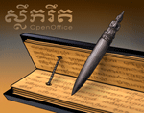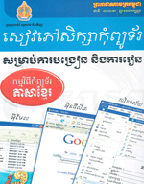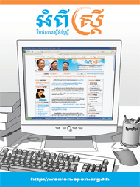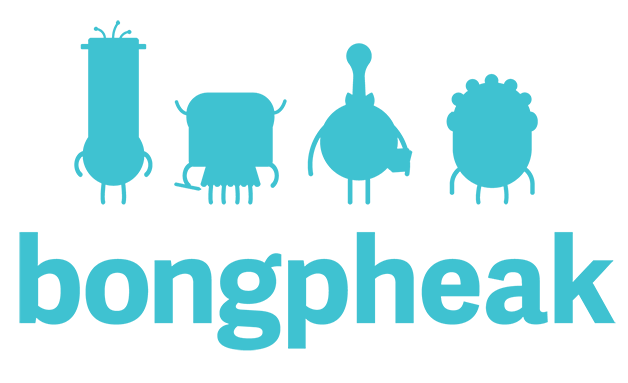Programs
Our Last Three Years of Work
From 2019 to 2022 Open Institute, has collaborated with the Cambodian Ministry of Education, Youth and Sport (MoEYS) and the UNESCO/STEPCam programme to radically change the methodology used to teach Maths in grades 1 to 3 of Cambodian public schools. We have led the development of the new activity-based MoEYS Teaching and Learning Materials Packages for the Maths subject, including teacher guides, exercise books, and workbooks for home use. Our team has also developed animation videos briefly reviewing each piece of content in these three grades, and teaching how to do each exercise in the workbooks for home work (Happy Maths video collection). The workbooks now include QR codes in each exercise, linking directly the exercise to the video that teaches how to do it, as well as to the theory behind the exercise. We have also supported the Ministry in the deployment of these materials to all teachers in five provinces. To ensure that all newly-trained teachers acquire the right attitude to teach using an activity-based methodology, and learn how to use these packages, Open Institute - in collaboration with the Teacher Training Department and UNESCO - has adapted the Maths Methodology curriculum in all Teacher Training Institutions to include and teach the newly created Maths packages, and have then trained all Teacher Educators on how it this new curriculum should be delivered.
Open Institute has also worked on general improvement of the pedagogical capacity of Primary School Teacher Educators, who are in charge of training all Primary School teachers. The work, supported by UNESCO, was done through an extended "blended" modality training on pedagogy delivered in each one of the Primary School Teacher Training centers in the country. The course equipped Teacher Educators with a stronger base in Pedagogy through repeated practice and reflection, and a clear understanding of activity-based pedagogy. The course helped them develop a peer-partnership system for Continuous Professional Development, allowing them to continue collaborating among themselves to improve their teaching skills
Open Institute has collaborated since 2007 with the MoEYS Department of Information Technology. During all this time we have led the work in the development of ICT in Education policies, participated in teacher and Ministry staff training, written the ICT-subject curricula for upper secondary school, and written the official textbooks. We have also developed different applications to facilitate school inspection and to help schools develop strategic plans. During 2021 and 2022, supported by UNICEF, we worked with them to ensure easy access by parents and students to over 8,000 pieces of digital learning materials (classroom videos, Maths animation videos, worksheets, workbooks, etc.) developed by MoEYS and partners, and which students can use at home to complement their education.
One of our core beliefs is that - in order to succeed in education - children need support from their parents. As parents did not have any reference materials which they could use to help their children, Open Institute decided to use its energy and know-how to create materials that parents could use in order to provide this support. In particular, Open Institute started a collection of workbooks that - under the name of Koun Sva Chhlat (Clever Little Monkey) - provides parents a tool to guide the practice that their children need to do every day at home. During these years Open Institute has so far developed 33 workbooks that include Khmer Writing Practice and all the Maths workbooks developed together with UNESCO, also covering basic learning in preschool. These workbooks - developed together with MoEY - and accepted as part of its core resources for learning how to write Khmer and for maths in grades 1 to 3, are fully aligned with the program, textbooks, and teacher guides, providing the exact practice that students need to do at home. Even if the parents are not familiar with the content children need to learn, or with the way of teaching it, KounSvaChhlat workbooks (and the linked videos through QR codes) allow them to help their children. The books can either be downloaded from the Internet and printed, or bought at bookstores at a very low price. In 2021, in response to Covid-19, UNICEF printed and distributed these workbooks to all grade 1 and grade 2 children in Cambodia (more than 750.000 children). In 2022 they have distributed books to children in 14 provinces. Open Institute continues developing new titles, hoping to be able to support - in the near future - the first three years for Khmer and all of Primary education for Maths.
2023
Our present work focuses on the main opportunities to improve the Cambodian education system that we have detected over the last three years.
- We continue to work on the improvement of the preparation of early-grade teachers, now focusing on contract teachers, teachers who are hired by MoEYS to cover vacant positions that cannot be covered by the number of teachers who graduate each year from the Teacher Training Institutions. Teacher retirement and the needs of new schools outpace the production of trained teachers in these institutions. Contract teachers normally have no or little training, and they serve some of the most remote schools in the country. Providing some training to them has become a priority for MoEYS, and therefore for us.
- We also work to improve the teaching and learning materials that have already been produced by MoEYS for early-grade learning; while we have already created videos and inserted QR codes in the workbooks for Maths, the same work needs to be done on materials for learning Khmer language, to facilitate parent support also in this key subject.
- We continue to work on technological support for education. In particular, we are working to offer all early-grade teachers the Teacher Guides and other materials through electronic means that facilitate their work. In this line, we are working on a Telegram bot that will serve to teachers the specific materials that they need in order to teach the specific page of the textbook that they have to teach in a given day.
- We will also be working on new KounSvaChhlat workbooks for Khmer grade 2.
- We will advance on our work to create a URL redirection system that provides the necessary resilience to the use of QR Codes in teaching and learning materials
- Bong Pheak
As part of the USAID Cambodia CTIP Program Open Institute has developed and launched Bong Pheak, an employment service that aims to prevent situations of trafficking in persons by linking unskilled and low-skilled workers with available job opportunities in their own country. The Bong Pheak service uses innovative technologies to identify those who are at the highest risk of becoming victims of TIP, provides them with employment information, and simplifies contact with employers, reducing their vulnerability. After only a few months of operation, Bong Pheak has already proven its usefulness in helping potential migrants find unskilled and low-skilled jobs inside Cambodia.
Bong Pheak is the first attempt, worldwide, to use technology to fill the information gap between employers and low-skilled workers. This worker group is usually not addressed by Employment Services in developing countries because of their lack of knowledge and access to the Internet. However, the Bong Pheak employment service has been able to work around this limitation by applying social engineering and an innovative mix of well-established technologies. Reducing this gap strongly decreases one of the main factors of risk for migrants: usage of risky intermediaries or traveling to find jobs without having secured one first.
The USAID Countering Trafficking-in-Persons program, led by Winrock,ith support from International Justice Mission (IJM) and Open Institute, works to strengthen the Royal Government of Cambodia's capacity to design, lead, coordinate and evaluate in-country and regional efforts to combat all forms of trafficking in persons; enhance survivor protection and care services of all forms of trafficking in persons; improve law enforcement capacity to identify and prosecute traffickers and crimes related to trafficking; and promote effective national and local prevention strategies to reduce trafficking in persons.
CitiesForAll
The Open Institute provides technical support to this three 3-year project funded by the EU and by the Czech Cooperation Agency. The project, led by People in Need, and with the participation of Sahmakum Teang Tnaut (STT), Urban Poor Women Development (UPWD), and Open Institute, involves:
a) Mapping, enumerating and undertaking legal land tenure surveys in the urban poor communities excluded from the systematic land titling process in Phnom Penh; b) Participatory preparation of onsite re-development plans with an aim to identify win-win solutions for the communities, private developers and local authorities; c) Environmental sanitation and small scale infrastructure upgrades in the selected communities, and d) Supporting the Phnom Penh Municipality led Urban Poor Poverty Reduction Working Group.
Open Institute's participation in this project involves developing and facilitating the use of data collection tools for collecting information on land claims, and using this data to automatically generate personalized legal advice sheets about each claim.
Our participation in the CitiesForAll project involves automatically generating text and voice documents that describe the specific legal status of a given property, based on data entered by the occupant, on maps, and on the current land law in Cambodia. The text report can be used in a court or negotiation, while the voice file provides information in colloquial local language that can be easily understood by the occupants. For data collection and storage in this work the Open Institute uses and develops on top of the open source application "Open Tenure" designed and created by FAO.
- Child Friendly Schools Monitoring Modernization
Open Institute, as a partner of UNICEF, support the Ministry of Education, Youth and Sport on the modernization of the system used by the Ministry to monitor the improvement of the schools on their goal of being supportive educational centers for the students. The objective of the work is to enable the Ministry to produce, as fast as possible after monitoring them, feedback for the schools that will help them improve the quality of the education they render to students and the conditions under which this education takes place. The system also allows the Ministry to supervise how the monitoring takes place and how individual schools and the whole system advance towards true child friendly schools. Open Institute has supported the Ministry and UNICEF in the improvement of the school checklist, making inspections simpler, faster, and objective. The survey has been implemented as a tablet application, and data is immediately collected and available to the Ministry through a specialized dashboard, allowing Ministry staff to understand the state of schools in their area and measure advance. Piloted in 2016, the system is being widely deployed in 2017 and 2018.
Monitoring of Residential Care Institutions.
Open Institute partners with UNICEF to support the Ministry of Social Affairs, Veterans and Youth Rehabilitation (MoSVY) to do a first level assessment of the conditions under which children live in residential care institutions (such as orphanages) in Cambodia. Open Institute has worked with UNICEF and the MoSVY to define a survey that will provide sufficient information to understand if deeper inspection of a residential care institution if necessary. The survey has been implemented as a tablet aplication, and data is immediatly collected and available to the Ministry through an specialized dashboard, allowing Ministry staff to understand the state of inspections and if furhter interventions are necessary. The project is being scaled nationally in 2017.
SPIDER ICT4D Network
Creation of a netwrok of ICT4D practitioners in Cambodia through which organisations can meet and learn about the use of ICT for development in their sector and about specific technologies that they can consider. The network attempts to increase access to knowledge for NGO ICT practitioners in Cambodia, often isolated. It also pretends to help start-ups or social entrepreneurs better understand the problems they attempt to solve through business approaches. The project will generate a collection/database of lessons learned of ICT in development in the Cambodian context, as well as reports that analyse these experiences.
Khmer OPtical Character Recognition (OCR)
Open Institute, in close collaboration with technical universities in Cambodia, is working on creating a solid OCR solution for Khmer script that will make selected old Khmer documents readable and allow researchers and professionals to find and consult a much larger number of legal documents, research and old publications written in Khmer language.
- USAID Social Health Development
Open Institute participation in this project, led by University Research Corp. (URC), involves developing the necessary tools for collecting data on patients in health centers around the country, and uploading it to the national databases of the Ministry of Health.
- USAID Quality Health Services
Open Institute participation in this project, also led by University Research Corp. (URC), involves making automatic phone calls to mothers of newborn children with pre-recorded messages that communicate important information for their health and the health of the baby. Data on mothers of newborn babies is produced by the work beign done in the Social Health Protection project.
- Khmer Software Initiative
 This program is the key fundamental and supporting program to all other programs of the Open Institute. This program open doors to computer program localization and development in Cambodia with the vision that language will not be a barrier to access technology, development and learning. The mission of the program is to ensure that local language echnology is available to as many people as possible, and that it is used for cultural, educational and economic growth.
This program is the key fundamental and supporting program to all other programs of the Open Institute. This program open doors to computer program localization and development in Cambodia with the vision that language will not be a barrier to access technology, development and learning. The mission of the program is to ensure that local language echnology is available to as many people as possible, and that it is used for cultural, educational and economic growth.
- Education (Open Schools Program)
 The Ministry of Education, Youth and Sport and the Open Institute jointly implement the Open Schools program with a belief that effective use of ICT can improve the quality of education. The program is committed to ensure the development of all the necessary tools required to improve the quality of education through the use of ICT, including the necessary plans, computer programs in Khmer language, curricula, distance learning methodology, training materials, and technology for sustainability.
The Ministry of Education, Youth and Sport and the Open Institute jointly implement the Open Schools program with a belief that effective use of ICT can improve the quality of education. The program is committed to ensure the development of all the necessary tools required to improve the quality of education through the use of ICT, including the necessary plans, computer programs in Khmer language, curricula, distance learning methodology, training materials, and technology for sustainability. - Starting in 2007, the Open Schools programs helped develop and implement the Master Plan for ICT in Education 2009-2013. As part of this work it has developed curricula for ICT for students (grades 11 and 12) and teachers. It has also written the ICT textbooks for grades 11 and 12 as well as materials for training of pre-service upper secondary school teachers. It has supported the Ministry in defining standards for the use of Khmer language in computers and maintained Khmer translations of open source applications (OpenOffice, Firefox, etc.) to enable teaching in schools using only Khmer language software. It has also supported programs to train in-service teachers on the use of ICT, and developed over 300 videos for teacher training in STEM subjects, and localized interactive multimedia applications to support student learning of STEM subjects.
- In 2017 the Open Institute is working with the Ministry in several fronts: preparing a new Policy and Action Plan for ICT in Education 2016-2020 that is better adapted to the new reality of access to technology in Cambodia; doing research on use of technology by teachers and students; analyzing new channels of communication to engage teachers and older students; developing curricula for ICT courses for grades 4 to 10; developing mobile games to motivate students to have a better knowledge of curriculum topics; publish a book on Research Methodology; working on providing in-service teachers access to self-training materials in video format; and developing no-technology materials for development of graphomotor skills in pre-schools.
- SPICE - Structuring Partnerships for an Innovative Communications Environment
The USAID-funded SPICE program, implemented by the Open Institute, facilitates social and business innovation using communications technology and improves communications in Khmer via mobile devices. The purpose of the program is to build on partnerships between technology-oriented civil society organizations (CSOs) and private sector entities to utilize existing technologies to promote and deliver a greater diversity of information to the public, improve communications in Khmer using mobile devices, and increase the capacity of CSOs to use social media for development purposes.
FInal documents about this program and a video are available at the Reports section of this website.
- Women's Empowerment for Social Change
 This program aims at improving social and gender equality through advocacy and the promotion of information sharing and communication. This program also creates stronger synergy among the women's organizations and women activists through the open space for sharing and discussing women issues on the Women's Web Portal. Women's Empowerment for Social Change is designed to help women exercise their rights in a balanced way and can build competence to become self-sufficient, with improved women's participation in social, economic and political life, the program also provides capacity building, forum discussions on key women's issues and research on women and ICT.
This program aims at improving social and gender equality through advocacy and the promotion of information sharing and communication. This program also creates stronger synergy among the women's organizations and women activists through the open space for sharing and discussing women issues on the Women's Web Portal. Women's Empowerment for Social Change is designed to help women exercise their rights in a balanced way and can build competence to become self-sufficient, with improved women's participation in social, economic and political life, the program also provides capacity building, forum discussions on key women's issues and research on women and ICT. - ICT4D Cambodia Network (phase I)
Read more .... - Promoting Youth Engagement in Development through the use of ICT” project (PYD_ICT)
Read More....
- Lexicography
 Starting as a project to create electronic tools to support the use of Khmer language (a spell-checker and an electronic dictionary), the project has digitalized all the existing lexicographic resources for Khmer (old dictionaries, etc.), most of them almost lost after the Khmer Rouge genocide. Also, as the reference dictionary for the Khmer language only defines 17.000 of the almost 50.000 current words (without entering into specific fields), advancement on Khmer Lexicography must go through the writing of definitions for many of these words that still do not have them. This is a long process, but the project has started it, hoping that in a few years, with this and other efforts, it will be possible to write a dictionary of the Khmer language with all 50.000 definitions.
Starting as a project to create electronic tools to support the use of Khmer language (a spell-checker and an electronic dictionary), the project has digitalized all the existing lexicographic resources for Khmer (old dictionaries, etc.), most of them almost lost after the Khmer Rouge genocide. Also, as the reference dictionary for the Khmer language only defines 17.000 of the almost 50.000 current words (without entering into specific fields), advancement on Khmer Lexicography must go through the writing of definitions for many of these words that still do not have them. This is a long process, but the project has started it, hoping that in a few years, with this and other efforts, it will be possible to write a dictionary of the Khmer language with all 50.000 definitions.





